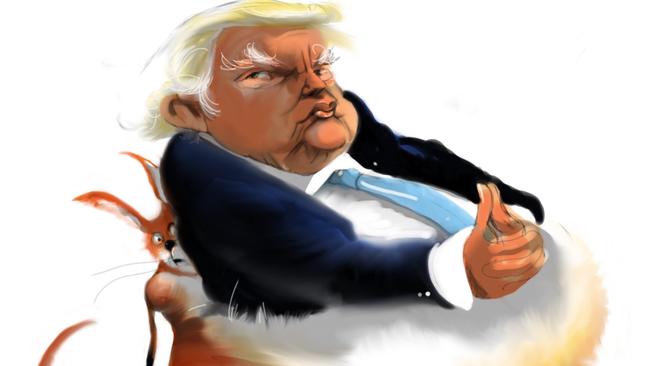We’ll take it from here, mate

The way Donald Trump made and announced his recent decision to withdraw all US military forces from Syria and half from Afghanistan is more of a worry than the decision itself.
The world’s concern is validated by the fact the President may be backing off to some less precipitate policy, but a US under Trump is moving away from the “endless wars forever”.
US allies, including Australia, must accept that a US under Trump requires them to contribute more and do more, and so carry a fair burden in any alliance. If Trump can pull out of Syria on a whim, what of Yemen, Libya, Somalia, Iraq, South Korea and even NATO?
Making policy decisions is the essence of leadership. Some leaders will consult widely and test their decisions before publicly announcing them. Where time is tight, consultation can be restricted but testing of a decision, at least briefly with staff and allies, is normally wise except in extreme situations.
Today a president can make a snap decision and release it on Twitter before staff can advise anyone, leaving allies confounded and staff picking up the pieces. Many have asked if Trump has the experience or temperament to make intuitive decisions, or if this is just a strategic “rush to failure”. The last president prepared by experience to operate on the international stage was George HW Bush. He fought in a war, was vice-president for two terms, headed the CIA — but even this did not make him perfect.
No president since (Bill Clinton, George W. Bush, Barack Obama and now Trump) has had anything like adequate preparation for strategic decision-making, and it shows.
Trump has been called the “disrupter-in-chief” because he so often creates chaos, a legitimate tactical technique, but world and regional stability need a degree of predictability and trust. How can anyone judge his decision on Syria without knowing what the US policy objectives now are in the Middle East? It certainly goes against the US national security strategy written last year by his former defence secretary, Jim Mattis.
International concern with Trump’s decision on Syria is reinforced by the adverse reaction of almost the entire US national security team and even his own party leaders, and the resignation of two key security team members.
Trump’s decision is likely to have little direct effect on the war in Syria, which Bashar al-Assad and his allies decisively have won.
If the US forces do withdraw, then Assad will tidy up Syria east of the Euphrates to the extent that the Turks let him, the Kurds will effect some deal with Assad to protect them from the Turks, and Islamic State fighters will keep their heads down for at least a little while.
But, of course, it would be wise to look sceptically at anything a US president says.
This is the third time the Kurds have been abandoned by the West since the first Gulf war, which puts them well ahead even of the South Vietnamese, the Hmong and the Montagnards.
The supposed basis of the Trump decision, the defeat of Islamic State, is premature. The caliphate has definitely been smashed and Islamic State has reverted to terrorism and insurgency based primarily in Iraq.
Trump’s withdrawal decision is consistent with the characteristic failure of post-Cold War strategy by the West. What now passes for strategy is to intervene with inadequate military force, find that military efforts are facing defeat, initiate a surge with an adequate-sized military force but, as soon as it starts to achieve success, withdraw it, then start arguing about re-intervention.
What Trump has just done in Syria is another variation on the failure of US and allied strategy since 1989.
But now the West is challenged by far greater forces than in the Cold War, and free-riding for allies on Trump’s America is not going to work.
Australia should be deeply concerned about what has just happened. We claim that the US is the centre pole of our defence policy but that pole is limp.
Unlike many US allies, Australia gets close to pulling its weight. The Coalition government, to its great credit, has embarked on the largest peacetime rearmament program — $200 billion across 10 years.
Not only Trump’s unpredictability is the concern; even if the US wanted to assist allies, its military capability is far less than it used to be. The US military, which used to claim it could win two major wars and one minor one simultaneously, is questioning whether it can win even one war in an even more uncertain world.
Australia must be the master of its own destiny in these times. The US has been a great partner for the past 75 years but the world has changed. So has the US, and so must we.
Jim Molan is a senator for NSW.


